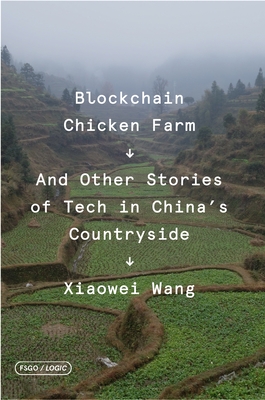Blockchain Chicken Farm: And Other Stories of Tech in China's Countryside
Technology in China is a captivating subject for numerous reasons. However, outsiders often perceive the massive country and its vibrant tech scene only through the narrow lens of big, corporate conglomerates located in metropolitan areas like Beijing, Shanghai, or Shenzhen. But it’s crucial to remember that, despite significant migration towards cities, rural China still boasts a population of almost 500 million people, surpassing both the European Union and the United States.
The impact of 5G internet access, e-commerce, AI, and blockchain on those living the countless small towns and villages all across China’s huge countryside lies at the heart of Xiaowei Wang’s collection of stories. As the book unfolds, it becomes evident that China’s rural population is neither solely a passive victim or a fortunate beneficiary of these innovations. Quite the contrary, the creative ways in which farmers, families, village administrators, and many others utilize technology shapes its future just as much as the tech influences people’s lives.
The stories recounted by Xiaowei Wang are equally fascinating, inspiring, and unsettling. They showcase how ambivalent and nuanced one has to discuss the consequences of, for example, an entire village suddenly embracing the mass-production of cheap goods that end up on Alibaba.com: On the one hand, this leads to drastic improves in the quality of life as poverty diminishes. On the other hand, the environmental footprint of such operations is huge. And people’s sense of autonomy can be greatly dampened when they feel reduced to mere cogs inside a global economic machinery. Furthermore, what happens when it’s not just one or two villages who jump on the Alibaba bandwagon, but hundreds or thousands at once? As the author keeps reminding us, everything that happens in China happens at a scale that’s unimaginable for most outsiders.
While Xiaowei Wang flavors the book with personal history and firsthand experiences, the narrative never veers into sentimentality. Some scenes and descriptions however bound so much on the poetic as to make the reader question whether the book really belongs on the “non-fiction” shelf. Nevertheless, the work maintains a constant sense of truthfulness and objectivity, despite being comprised primarily of anecdotes and observations. Such as, for instance, the eponymous tale of the clever chicken farmer who conjured up a unique value proposition for their organic chickens: Allowing consumers to track their origin via tamper-proof, blockchain-backed certificates and 24/7 video surveillance.
Overall, Xiaowei Wang’s book provides a captivating exploration of technology’s impact on rural China, shedding light on both its positive and negative consequences. It challenges readers to reflect on the intricate relationship between technology and society, leaving them with a deeper understanding of this multifaceted topic.
